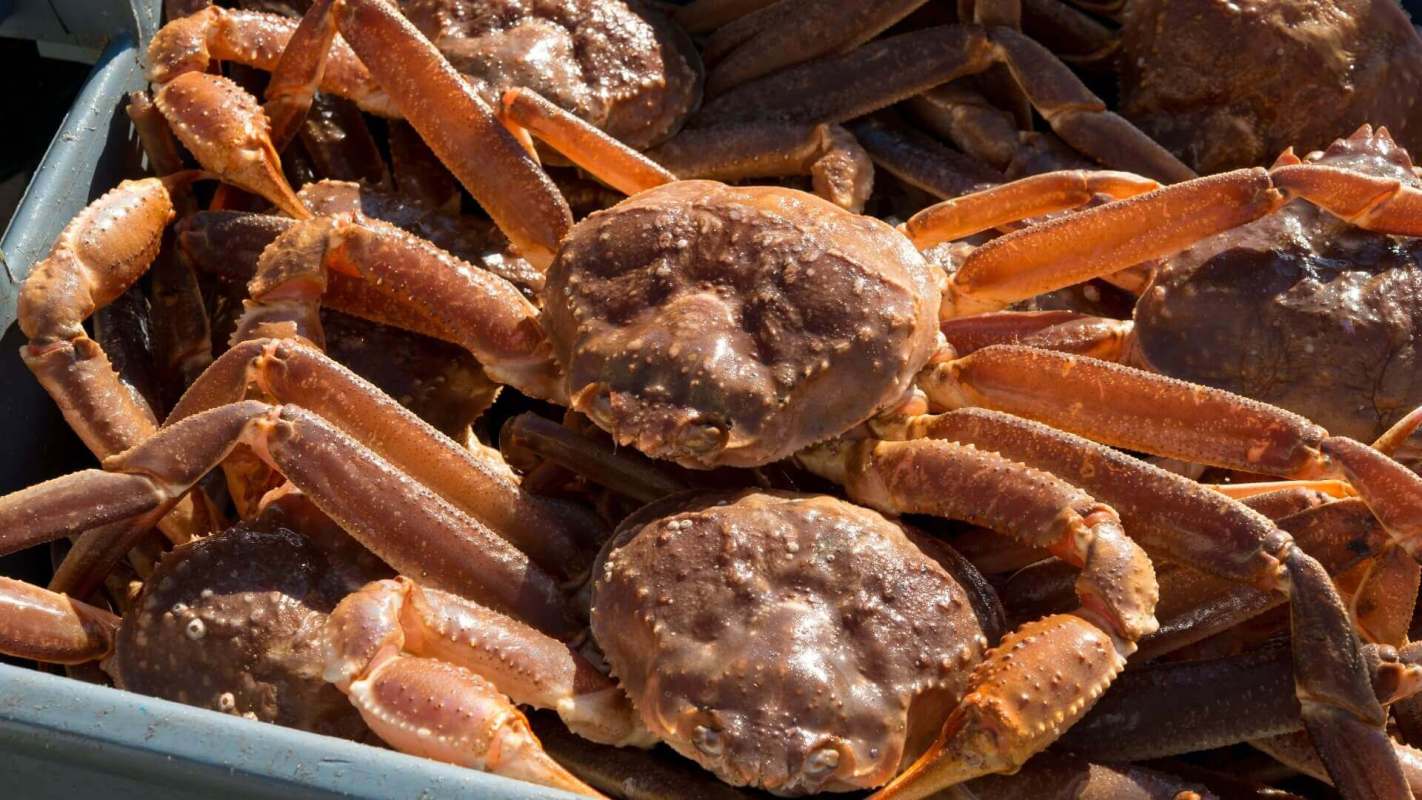Crabbing is king in Alaska. Fisheries in the state produce three-fifths of American seafood, and snow crab is one of the most important species to the state's economy, bringing in an estimated $132 million annually. But not this year.
For the first time ever, the Alaska Department of Fish and Game (ADF&G) announced that it would be canceling the 2022/23 Alaskan snow crab season in the Bering Sea — the stretch of ocean between western Alaska and eastern Russia — because stocks of the crustacean were dangerously below the population threshold needed to allow for fishing.
This coincides with the second cancellation of the red king crab season in two years due to a plummeting population, putting the entire crabbing industry, its employees, and the greater Arctic ecosystem in jeopardy.
"It's going to be life-changing, if not career-ending, for people," 63-year-old snow crab fisherman and boat captain Dean Gribble Sr. told NBC News. "A lot of these guys with families and kids, there's no option other than getting out."
Benjamin Daly, a researcher with the Alaska Department of Fish and Game, told CNN he estimates that the Alaskan snow crab population shrank from around 8 billion in 2018 to 1 billion in 2021, an alarming statistic that became widely cited by media outlets and social media users alike.
WHAT KILLED THE CRABS?
— spencer 🦀 (@Unpop_Science) October 16, 2022
The official story is something like "a billion snow crabs disappeared."
If that sounds fishy to you, keep reading. Let's dive into the ecology, oceanography, & geopolitical history of the Bering Sea.
A science thread on crabs, corruption, & collapse: 🦀 pic.twitter.com/X6i4yKC4mq
Many painted the population depletion as a "mysterious" disappearance, while others pointed to rising global temperatures as the lone cause of the die-off and the reason for the crabs' move north toward colder waters.
While it's absolutely true that the warming of our oceans, caused by the burning of dirty energy sources like coal and gas, has had a devastating impact on Arctic ecosystems, there may be more factors at play in the vanishing of crab populations.
Spencer Roberts, a science and environment writer, penned a viral Twitter thread on Oct. 16, expanding on what he believes are a multitude of factors behind the snow crab collapse.
Roberts began by explaining that due to the overheating of our planet and oceans, snow crabs have been left in a vulnerable position.
Since snow crabs are adapted to survive in frigid waters, many of their predators have been unable to hunt adolescent snow crabs as they grow and age. But as ocean waters heat up, young snow crabs become sitting ducks for predators like cod in warmer water.
Roberts continued on to pin the fishing industry as a major culprit responsible for the crabs' disappearance, explaining that after sea ice disappeared because of the planet's overheating, fishing boats began to trawl the waters of the Bering Sea where snow crabs normally breed safely.
He also claimed that the way in which the National Oceanic and Atmospheric Administration (NOAA) measures the negative impact of trawling is leading to the underestimation of the impact of commercial fishing on snow crab mortality.
When we dig further into the vessel logs, a striking pattern emerges: scores of ships trawling for hundreds of hours across the Northern reaches of the Eastern Bering Sea floor during critical breeding months in areas where snow crabs once could take shelter beneath the ice. pic.twitter.com/uVPfhzn6qD
— spencer 🦀 (@Unpop_Science) October 16, 2022
Some scientists for NOAA disagreed with Roberts' suggestion that commercial fishing was to blame. The Director of the Kodiak lab for NOAA Fisheries, for example, told CNN that "it wasn't overfishing that caused the collapse, that much is clear."
Roberts claimed that NOAA had previously deceived the public to hide that overfishing was a factor in the decline of the king crab population, contending that the organization was covering up its poor management.
He went on to allege that if it had not been for a whistleblower who came forward in 2021, the public would have been led to believe that natural phenomena, rather than human interference, was to blame for the disappearance of king crab, inferring the same might be true in the case of the snow crab.
"Evidence suggests melting sea ice created an opportunity for fishing vessels to wipe out crabs in habitat that was previously inaccessible in winter," Roberts concluded his viral thread, which has been retweeted over 19,000 times.
Evidence suggests melting sea ice created an opportunity for fishing vessels to wipe out crabs in habitat that was previously inaccessible in winter.
— spencer 🦀 (@Unpop_Science) October 16, 2022
Whatever the reason, or combination of reasons, behind the snow crabs' " mysterious disappearance," we must take action to protect vulnerable ecosystems, industries, and species, as well as the planet as a whole.
This includes implementing smarter management practices to replenish crab populations and limit the impact of fishing, aiding crabbers struggling with financial hardship as their industry hangs in the balance, and reducing our reliance on dirty energy sources to slow down the warming of our oceans.
Follow The Cool Down on Instagram and TikTok.








